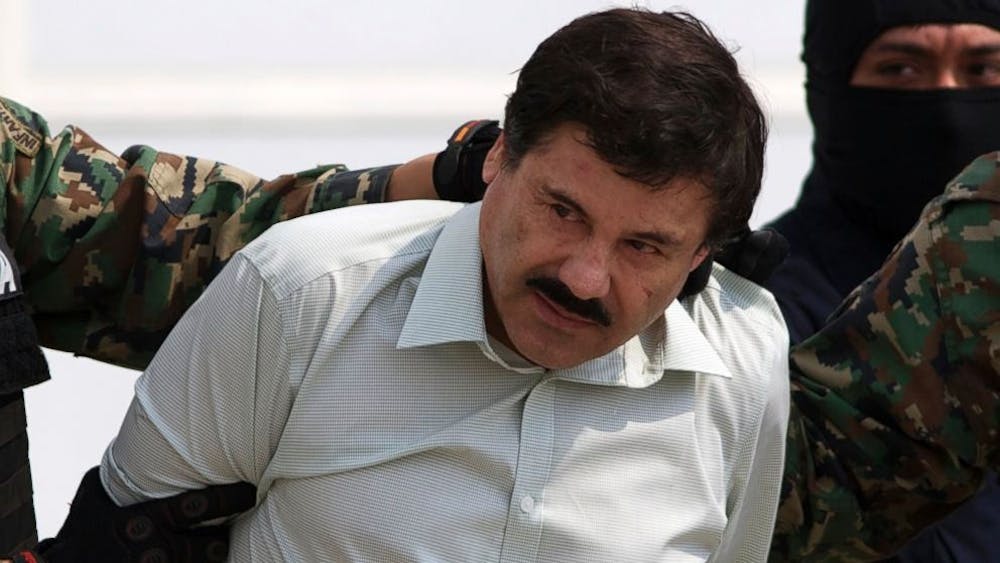If you’ve been keeping up with recent news, then you probably heard about the Mexican drug lord “El Chapo,” who was recently apprehended in a military raid. The raid, which can be viewed online, was conducted by the Mexican military, purportedly under the supervision of American law-enforcement agencies.
After famously escaping prison last summer, “El Chapo,” whose real name is Joaquín Guzmán, became one of the most wanted men in the world. His status as the head of the Sinaloa Cartel, possibly the most powerful drug-trafficking organization in the world, made him a target for many of America’s efforts to curb the influence of Mexican drug cartels.
With Guzmán’s return to the headlines, we are again reminded of America’s continued failure in the alleged “War on Drugs.”
It’s been over forty years since that term was coined by the press in response to Nixon’s new initiatives to combat the influence of drugs in America. Since then, the United States has doled out tens of billions in military aid to countries where the drug trade runs most rampant. A lot of our efforts have been focused on the Mexican cartels, whose astronomical growth over the years has extended their influence to the farthest reaches of the American homeland.
Despite the efforts of our various law-enforcement agencies (the DEA, FBI, and Federal Marshalls among others), modern drug kingpins are wealthier than ever before. Guzmán has been regularly included in Forbes’ annual “Most Powerful People” lists. His capture may seem like a step in the right direction, but there is little reason to be optimistic if you consider modern history. Guzmán is no stranger to imprisonment, and has staged multiple escapes leading up to now. This is hardly surprising when you consider his immense wealth and the corruption that lines the Mexican legal system.
The United States government is hundreds of billions in the hole with the War on Drugs, and with little to show for. As much as I admire our military and law-enforcement agencies, I think that it might be prudent to consider that just maybe we are going about this the wrong way.
When dealing with infectious diseases, there are two ways to go about treatment: There’s the right way and the wrong way. You can opt to merely treat the symptoms. Acetaminophen will ease a headache. But a headache is a symptom of a lot of different diseases, and temporarily alleviating a headache will not cure an ailment. If you simply spot-treat symptoms as they pop up, you’re wasting your time. If you’re blinded by the symptoms, your patient will die with you holding an ice pack to their head.
Defeating a disease requires a step back and a broader perspective. It takes analysis and critical thought. You have to understand what you’re dealing with to have a hope of defeating it. Only then can you strike at its core and tear its heart out, taking with you the symptoms that had only served to distract you.
It’s probably about time we stop lying to ourselves about why our War on Drugs has been an expensive failure. The U.S. government is treating the headache while the country lay dying on the table. The Sinaloa Cartel and its many competitors dump cocaine, heroin, methamphetamine, MDMA, and marijuana into America because there exists a market for them to do so.
Fight the cartels all you’d like. Build the biggest wall your heart desires. The true disease in America is the willingness to consume. You kill that, and you kill the cartels.
But nobody wants to hear this. College kids like to think that their casual drug use has minimal consequence. Nobody wants to be burdened by the thought that their small purchases support those whose hobbies include child abductions, mass executions, and large-scale corruption. The very things we as emboldened youths love to condemn from atop our pillars of morality.
America is quick to blame countries like Mexico for problems we have at our borders. But perhaps they have reason to blame us for ruining their country. Our continued drug use birthed the monsters that ravaged their nations and brought governments to their knees. When America sends resources south to counter the cartels, we are but fighting the symptoms of our own disease.
Enjoy what you're reading?
Signup for our newsletter
Contact opinions editor Joe DiBello at joseph.dibello@richmond.edu
Support independent student media
You can make a tax-deductible donation by clicking the button below, which takes you to our secure PayPal account. The page is set up to receive contributions in whatever amount you designate. We look forward to using the money we raise to further our mission of providing honest and accurate information to students, faculty, staff, alumni and others in the general public.
Donate Now



